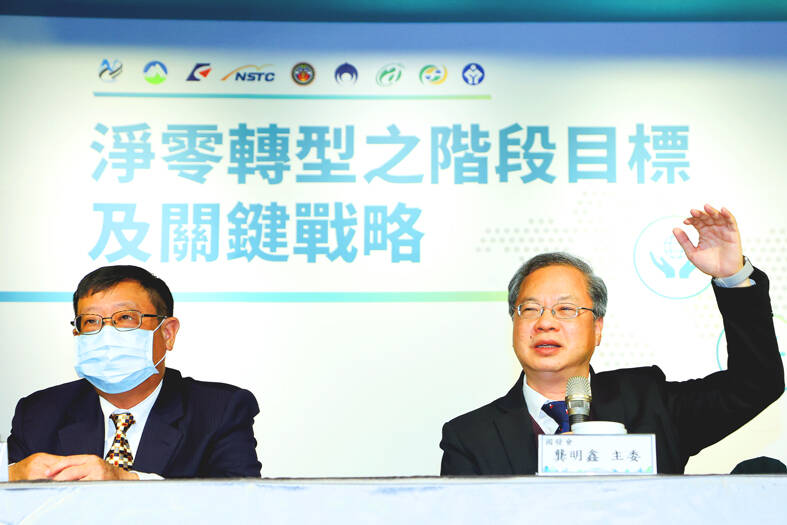Taiwan by 2030 aims to reduce emissions by 23 to 25 percent from 2005 levels and achieve net zero emissions by 2050, the National Development Council said yesterday.
To reach the 2030 goal, the agency revealed a slew of transition plans based on 12 key strategies, including power/photovoltaics, hydrogen energy, innovative energy, carbon capture, utilization and storage, and decarbonizing the transportation sector.
The government would spend nearly NT$900 billion (US$29.3 billion) by 2030 to realize the plans, the agency said.

Photo: CNA
National Development Council Minister Kung Ming-hsin (龔明鑫) said that transitioning to net zero is an unshirkable responsibility for Taiwan, and doing so could generate enormous business opportunities.
By 2030, the push toward net zero would spur about NT$4 trillion in private investment, generate production value of NT$5.9 trillion and create 551,000 jobs, Kung said.
To encourage small and medium-sized enterprises to cut emissions, the government is studying incentive measures, including subsidies and tax breaks, he added.
Environmental Protection Administration Minister Chang Tzi-chin (張子敬) said that discussions on issues related to carbon pricing, such as emissions trading systems and carbon taxes, were under way.
Chang has called for a carbon tax that reflects the true cost of greenhouse gas emissions and does not place undue burden on consumers.
Unsatisfied with the goal, several environmental groups, including the Green Citizens’ Action Alliance and Citizen of the Earth, Taiwan, yesterday in a joint statement said the government needs to take more ambitious actions to decrease emissions, adding that the 23 to 25 percent emissions reduction target is not sufficient.
The government is reviewing its 2030 Nationally Determined Contribution target of reducing emissions by 20 percent from 2005 levels, the base year for long-term efforts. It is also preparing updated contribution targets as required by the Paris Agreement.
The UN Framework Convention on Climate Change in a new report said that while many countries are reducing global greenhouse gas emissions, the 193 parties under the Paris Agreement would still increase emissions by 10.6 percent by 2030, compared with 2010 levels.

INVESTIGATION: The case is the latest instance of a DPP figure being implicated in an espionage network accused of allegedly leaking information to Chinese intelligence Democratic Progressive Party (DPP) member Ho Jen-chieh (何仁傑) was detained and held incommunicado yesterday on suspicion of spying for China during his tenure as assistant to then-minister of foreign affairs Joseph Wu (吳釗燮). The Taipei District Prosecutors’ Office said Ho was implicated during its investigation into alleged spying activities by former Presidential Office consultant Wu Shang-yu (吳尚雨). Prosecutors said there is reason to believe Ho breached the National Security Act (國家安全法) by leaking classified Ministry of Foreign Affairs information to Chinese intelligence. Following interrogation, prosecutors petitioned the Taipei District Court to detain Ho, citing concerns over potential collusion or tampering of evidence. The

Seventy percent of middle and elementary schools now conduct English classes entirely in English, the Ministry of Education said, as it encourages schools nationwide to adopt this practice Minister of Education (MOE) Cheng Ying-yao (鄭英耀) is scheduled to present a report on the government’s bilingual education policy to the Legislative Yuan’s Education and Culture Committee today. The report would outline strategies aimed at expanding access to education, reducing regional disparities and improving talent cultivation. Implementation of bilingual education policies has varied across local governments, occasionally drawing public criticism. For example, some schools have required teachers of non-English subjects to pass English proficiency

NEGOTIATIONS: The US response to the countermeasures and plans Taiwan presented has been positive, including boosting procurement and investment, the president said Taiwan is included in the first group for trade negotiations with the US, President William Lai (賴清德) said yesterday, as he seeks to shield Taiwanese exporters from a 32 percent tariff. In Washington, US Trade Representative Jamieson Greer said in an interview on Fox News on Thursday that he would speak to his Taiwanese and Israeli counterparts yesterday about tariffs after holding a long discussion with the Vietnamese earlier. US President Donald Trump on Wednesday postponed punishing levies on multiple trade partners, including Taiwan, for three months after trillions of US dollars were wiped off global markets. He has maintained a 10 percent

TRADE: The premier pledged safeguards on ‘Made in Taiwan’ labeling, anti-dumping measures and stricter export controls to strengthen its position in trade talks Products labeled “made in Taiwan” must be genuinely made in Taiwan, Premier Cho Jung-tai (卓榮泰) said yesterday, vowing to enforce strict safeguards against “origin laundering” and initiate anti-dumping investigations to prevent China dumping its products in Taiwan. Cho made the remarks in a discussion session with representatives from industries in Kaohsiung. In response to the US government’s recent announcement of “reciprocal” tariffs on its trading partners, President William Lai (賴清德) and Cho last week began a series of consultations with industry leaders nationwide to gather feedback and address concerns. Taiwanese and US officials held a videoconference on Friday evening to discuss the